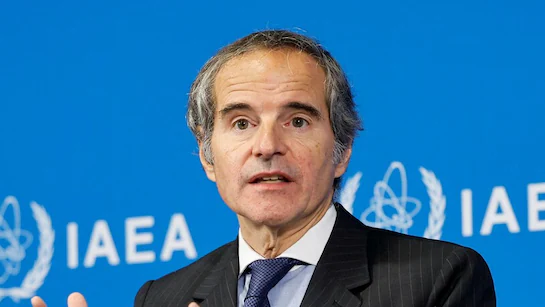IAEA Chief Rafael Grossi Warns of Rising Nuclear Risks Amid Tensions in Ukraine and Iran
Published on June 11, 2025 | By Today International News
Vienna, Austria – As global tensions around nuclear security continue to escalate, Rafael Mariano Grossi, Director General of the International Atomic Energy Agency (IAEA), has once again sounded the alarm on growing nuclear risks—highlighting both the volatile situation at Ukraine’s Zaporizhzhia nuclear plant and Iran’s advancing uranium enrichment program.
Grossi, who has become one of the world’s most prominent voices in nuclear diplomacy, recently completed another high-stakes inspection tour at Zaporizhzhia, Europe’s largest nuclear facility. The site has been a focal point of international concern since Russia’s invasion of Ukraine in 2022, with repeated shelling and power cuts threatening potential disaster.
At the same time, Grossi is intensifying diplomatic efforts to re-engage Iran in talks aimed at limiting its nuclear programme, amid fears that Tehran is inching closer to weapons-grade enrichment levels.

Zaporizhzhia: A Nuclear Plant in a War Zone
Speaking to reporters after his visit to Zaporizhzhia, Grossi described the situation as “fragile and dangerous”. Despite ongoing IAEA presence at the plant, which is currently under Russian control, Grossi warned that security protocols remain inadequate due to continued military activity in the region.
“We are walking a tightrope,” he said. “One miscalculation could lead to a radiological emergency with global consequences.”
Grossi urged all parties—Russia, Ukraine, and NATO members—to honor nuclear safety and security principles and avoid any military actions near the site. The IAEA has also renewed calls for the establishment of a nuclear safety protection zone around the plant, a proposal that remains stalled in international negotiations.
Iran Enrichment Talks Back in Focus
Meanwhile, Grossi is pushing for renewed dialogue with Iran, whose nuclear program has advanced significantly in recent years. Tehran has reportedly enriched uranium to 60% purity, just short of weapons-grade levels, following the collapse of the 2015 nuclear deal.
In recent weeks, Grossi has met with Iranian officials in Vienna and Tehran, calling for greater transparency, unrestricted inspections, and a return to diplomatic commitments under the Joint Comprehensive Plan of Action (JCPOA).
“The window for diplomacy is narrowing, but it is not yet closed,” Grossi stated during a press conference at IAEA headquarters. “We must prioritise dialogue over confrontation.”
The United States, European Union, and regional players like Saudi Arabia and Israel are closely watching the outcome of these discussions. A failure to reinstate some form of agreement could spark a regional arms race or potential military action.
Championing Civilian Nuclear Energy
Despite the ongoing crises, Grossi continues to advocate for civilian nuclear energy as a vital solution to the global energy transition. Under his leadership, the IAEA has expanded technical cooperation with developing countries, supporting nuclear power projects, medical applications, and agricultural innovations.
“Peaceful nuclear technology can lift millions out of poverty and reduce carbon emissions,” Grossi said. “But it must be protected from the dangers of war and proliferation.”
He emphasised that global security and sustainable development go hand in hand when it comes to nuclear policy.
A Future UN Secretary-General?
Grossi’s high-profile role in managing two of the world’s most pressing nuclear flashpoints—Ukraine and Iran—has fuelled speculation that he could be a leading contender to become the next United Nations Secretary-General once António Guterres’s term ends.
Diplomatic sources suggest Grossi’s reputation for neutrality, technical expertise, and global engagement make him a strong candidate. While he has not publicly confirmed any such ambitions, his increasing visibility on the world stage continues to draw attention.
Conclusion: Diplomacy in a Dangerous Nuclear Era
Rafael Grossi stands at the crossroads of diplomacy, science, and crisis management. From war-torn Ukraine to the Persian Gulf, his mission is clear: prevent nuclear disaster while promoting peaceful energy solutions. As the risks rise and the world watches, the IAEA’s leadership has never been more crucial.
